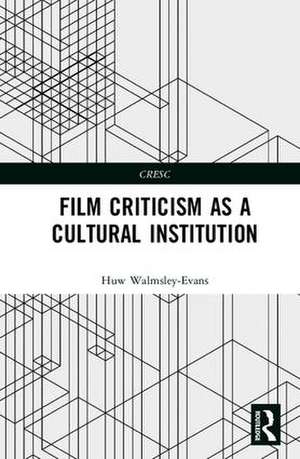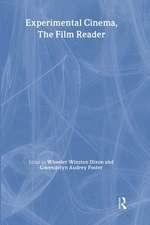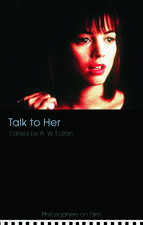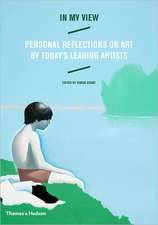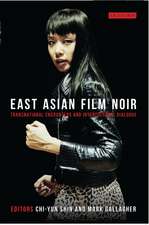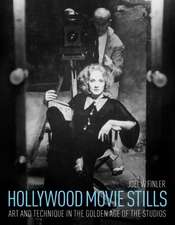Film Criticism as a Cultural Institution: CRESC
Autor Huw Walmsley-Evansen Limba Engleză Hardback – 6 apr 2018
Film Criticism as a Cultural Institution first examines the contemporary crisis conversation surrounding film criticism, comparing this to historical precedents. It then provides what today’s crisis conversation does not: an account of film criticism’s institutional formations. Using primarily U.S. and Australian case studies based on interviews, observation and archival research—as well as accounts from other national schools—the book maps contemporary film criticism. Across various sites, such as publications or online spaces, and organisations, such as film critics circles, it elucidates film criticism’s institutional practices, tasks, comportments, and personae.
Looking at the history of conversations about film criticism shows us that "crisis" has always been a leitmotif. While acknowledging the considerable changes and challenges that film criticism faces today, this book situates these within an historical context and proposes an institutional framework that allows us to move beyond crisis discourse. Looking at film criticism in this way allows us to see that the very question of what counts as film criticism is continually contested within an institutional ecology made up of distinctive critical comportments addressed to distinctive audiences.
| Toate formatele și edițiile | Preț | Express |
|---|---|---|
| Paperback (1) | 389.38 lei 6-8 săpt. | |
| Taylor & Francis – 12 dec 2019 | 389.38 lei 6-8 săpt. | |
| Hardback (1) | 1000.76 lei 6-8 săpt. | |
| Taylor & Francis – 6 apr 2018 | 1000.76 lei 6-8 săpt. |
Din seria CRESC
-
 Preț: 286.72 lei
Preț: 286.72 lei -
 Preț: 311.41 lei
Preț: 311.41 lei -
 Preț: 372.17 lei
Preț: 372.17 lei -
 Preț: 325.93 lei
Preț: 325.93 lei -
 Preț: 413.37 lei
Preț: 413.37 lei - 31%
 Preț: 764.20 lei
Preț: 764.20 lei -
 Preț: 365.87 lei
Preț: 365.87 lei - 18%
 Preț: 1499.06 lei
Preț: 1499.06 lei -
 Preț: 451.16 lei
Preț: 451.16 lei - 18%
 Preț: 1055.51 lei
Preț: 1055.51 lei - 15%
 Preț: 437.81 lei
Preț: 437.81 lei -
 Preț: 484.47 lei
Preț: 484.47 lei - 18%
 Preț: 1107.79 lei
Preț: 1107.79 lei - 18%
 Preț: 1059.45 lei
Preț: 1059.45 lei - 28%
 Preț: 821.96 lei
Preț: 821.96 lei -
 Preț: 408.54 lei
Preț: 408.54 lei -
 Preț: 485.03 lei
Preț: 485.03 lei -
 Preț: 448.44 lei
Preț: 448.44 lei -
 Preț: 489.57 lei
Preț: 489.57 lei -
 Preț: 389.38 lei
Preț: 389.38 lei - 26%
 Preț: 819.41 lei
Preț: 819.41 lei - 18%
 Preț: 1604.80 lei
Preț: 1604.80 lei - 18%
 Preț: 1055.38 lei
Preț: 1055.38 lei -
 Preț: 488.33 lei
Preț: 488.33 lei - 18%
 Preț: 1055.51 lei
Preț: 1055.51 lei - 18%
 Preț: 1062.98 lei
Preț: 1062.98 lei - 18%
 Preț: 1061.06 lei
Preț: 1061.06 lei -
 Preț: 473.20 lei
Preț: 473.20 lei -
 Preț: 489.26 lei
Preț: 489.26 lei -
 Preț: 410.50 lei
Preț: 410.50 lei - 18%
 Preț: 734.14 lei
Preț: 734.14 lei - 26%
 Preț: 766.12 lei
Preț: 766.12 lei - 18%
 Preț: 1000.27 lei
Preț: 1000.27 lei -
 Preț: 466.45 lei
Preț: 466.45 lei - 18%
 Preț: 1056.28 lei
Preț: 1056.28 lei -
 Preț: 454.81 lei
Preț: 454.81 lei
Preț: 1000.76 lei
Preț vechi: 1220.44 lei
-18% Nou
Puncte Express: 1501
Preț estimativ în valută:
191.49€ • 199.93$ • 158.49£
191.49€ • 199.93$ • 158.49£
Carte tipărită la comandă
Livrare economică 05-19 aprilie
Preluare comenzi: 021 569.72.76
Specificații
ISBN-13: 9781138186583
ISBN-10: 1138186589
Pagini: 212
Dimensiuni: 156 x 234 x 21 mm
Greutate: 0.47 kg
Ediția:1
Editura: Taylor & Francis
Colecția Routledge
Seria CRESC
Locul publicării:Oxford, United Kingdom
ISBN-10: 1138186589
Pagini: 212
Dimensiuni: 156 x 234 x 21 mm
Greutate: 0.47 kg
Ediția:1
Editura: Taylor & Francis
Colecția Routledge
Seria CRESC
Locul publicării:Oxford, United Kingdom
Public țintă
Postgraduate and UndergraduateCuprins
Introduction: Film Criticism as a Cultural Institution Part I: Understanding the Conversation 1. Crisis and Continuity in Film Criticism 2. Institutional Approaches to Film Criticism Part II: Towards an Ecology 3. Sites of Film Criticism 4. The Profession of Film Criticism 5. Film Critics Circles 6. Film Criticism and the Internet Epilogue: Film Criticism in the 21st Century
Notă biografică
Huw Walmsley-Evans has taught film, media, communication, and cultural studies for a decade at institutions including the University of Queensland and Queensland University of Technology. His writing has appeared in Screening the Past, Senses of Cinema, LOLA, and Screen Machine. He is the co-founder and co-director of the Queensland Film Festival. He received his doctorate from the University of Queensland in 2013. This is his first book.
Descriere
At the beginning of the 21st century film criticism was described as in crisis. This book takes a deeper look at film criticism by focusing on its institutional contours. This is achieved through a combination of archival research and new interviews with prominent film critics and stakeholders, including Adrian Martin (LOLA), Stephanie Zacharek (Time), Peter Bart (Variety), and Andrew Sarris (The Village Voice). While acknowledging the considerable changes and challenges that film criticism faces today, this book situates these within an historical context and proposes an institutional framework that allows us to move beyond crisis discourse.
